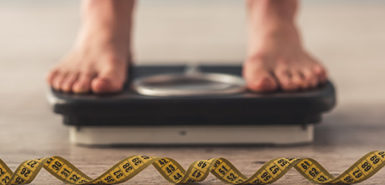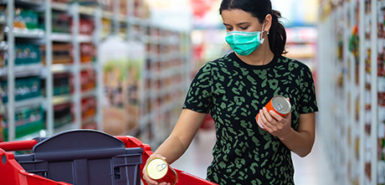
Packed on a few pounds during these stay-at-home months? Don’t be too hard on yourself.
“When we lose the schedule to our day, we actually tend to do less activity,” said Hanna Jaworski, MD, a pediatrician at Spectrum Health Helen DeVos Children’s Hospital.
In talking with children and parents at the Healthy Weight Center at Helen DeVos Children’s Hospital, Dr. Jaworski has seen how COVID-19 has loosened structures and routines.
It’s led to harmful habits such as boredom eating.
“Kids and adults as well are doing more grazing,” she said. “And they have free access to the pantry. That’s not a good thing.”
If you’re on a runaway train to weight gain and unhealthy habits, Dr. Jaworski has some suggestions to get back on track.
The No. 1 rule: Keep it simple.
“You don’t have to be perfect,” she said. “If you can see yourself going for a walk every day, that’s the right thing to do. It’s better than sitting on your couch.”
Scrap the vacation mindset
The stay-at-home environment has, for some, inadvertently led to something like a vacation mindset where anything goes.
That mindset disrupts schedules and introduces a lack of structure. Sleep routines get knocked off kilter, we end up snacking more frequently and our meals become less consistent.
“We’re behaving like we’re on vacation, but we’re not,” Dr. Jaworski said. “At some point you have to decide: ‘When are we going to go back to where we were before?’”
Don’t graze
Don’t make random, limitless trips to the pantry. Don’t eat straight out of a box or a bag. If you’re hungry, dole out an appropriate portion of something.
“If you’re going to have a snack, think about that size and what it should look like,” Dr. Jaworski said. The size of your palm is typically a proper portion size.
“If you’re having more than that, it might be too much,” she said.
Shop flexible
Fewer trips to the grocery store means fewer fresh fruits and vegetables on hand. But don’t aim to fill the holes with chips and dip.
“Keeping the unhealthy foods out of the house can go a long way in setting families up for success,” Dr. Jaworski said.
She’s normally a big advocate of meal planning.
“But that’s hard right now, depending on when you’re shopping and where you’re shopping,” she said.
For now? “You have to be flexible,” she said.
Map your meals
In the book of pandemic wisdom, add this: Don’t eat the applesauce before the apples.
Purchase foods that’ll last varying times, then orchestrate meals accordingly.
Buy salad mixes, berries and fresh veggies to last the first few days. Apples, pears and citrus foods will last longer. Canned and frozen goods will last beyond that. Boxed goods, too.
“Do them in waves,” Dr. Jaworski said. “You kind of have to figure out how long each of them are going to last and move through it in that order.”
Keep active
Learning and working at home doesn’t mean you and the kids are glued to home. Everyone needs to stay active, Dr. Jaworski said.
Limit screen time to two hours or less per day. When the kids finish schoolwork, let them play outside.
“Go ride your bike, play tag, something to get them out of the house and moving,” she said.
Don’t let long stretches pass without movement.
“I used to walk from patient room to patient room,” Dr. Jaworski said. “Now I feel like I sit all day.”
Once an hour, get up for a five-minute break.
“They do this in school,” she said. “It’s been shown to enhance your ability to retain information and incorporate new information. It helps with focus and attention.”
Manage emotions
This is a stressful time—and stress hormones can play into weight gain, Dr. Jaworski said.
“Families all over are dealing with stress related to health, income loss, food and housing security,” she said. “Additionally, parents are working hard to help manage their children’s education with virtual learning. Many are juggling work and child care.”
Social distancing has disrupted typical support networks that help people deal with stress.
“Our children are no different,” she said. “They are also suffering from stress related to uncertainties, virtual learning and lack of social interactions.”
Recognize what’s happening with you and your kids. Find ways to work through emotions positively.
If you can’t talk it out, get outdoors and go for a walk or a bike ride. It’s a great way to work through it.

 /a>
/a>
 /a>
/a>
 /a>
/a>
This is just the article for me, in spite of the fact that it makes me feel horribly guilty. The pandemic threw a wrench into my gym schedule and with the initial days of utter anxiety and panic, I resorted to comfort eating. Now, I am a few more kilos heavier. If it weren’t for this horrid summer, I would’ve walked daily to my office.